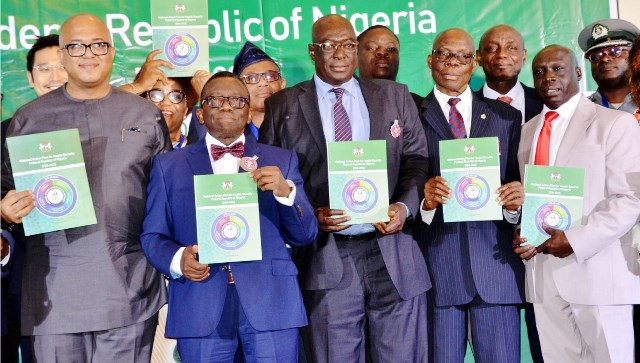Featured
NUC Approves New Curricula For Varsities

The National Universities Commission (NUC) has concluded a review of the Benchmark Minimum Academic Standards (BMAS) for University education in Nigeria.
NUC said the BMAS was revised to Core Curriculum Minimum Academic Standards (CCMAS) with the programme experts and industry stakeholders.
The commission said that CCMAS provides 70per cent of what should be taught along with the expected outcomes, while the universities will make contributions based on their individual contextual peculiarities and characteristics.
Executive Secretary of NUC, Prof. Abubakar Rasheed, disclosed the information in Abuja, yesterday, during the presentation of provisional operational certificate to proprietors 12 newly licensed private universities.
The newly licensed private universities are Pen Resource University, Gombe, Gombe State; Al-Ansar University Maiduguri, Borno State; Margaret Lawrence University, Galilee, Delta State; Khalifa Isiyaku Rabiu University, Kano, Kano State; Sports University, Idumuje-Ugboko, Delta State; Baba Ahmed University, Kano, Kano State.
Others are Saisa University of Medical Sciences and Technology, Sokoto, Sokoto State; Nigerian British University, Asa, Abia State; Peter University, Achina/Onneh, Anambra State; Newgate University, Minna, Niger State; European University of Nigeria, Duboyi, Abuja, FCT; and Northwest University, Sokoto, Sokoto State.
The NUC boss, in his remarks, disclosed that the number of private universities in Nigeria has risen to 111 and 215 universities in Nigeria, stressing that the number is insignificant when compared to growing population and increasing quest for university education.
He confessed that private universities have brought certain uniqueness to the Nigerian university landscape, disclosing that Federal Ministry of Education, through NUC has embarked on the radical re-engineering of curricula in Nigerian universities to meet global standards and international best practices towards preparing Nigerian graduates for relevance in the Fourth Industrial Revolution (4IR) world economy with the skills needed for the future.
He said the establishment of more private universities, under the strict supervision of the NUC, is also an important antidote to the proliferation of illegal universities or degree mills across the country, which has become a major source of worry and embarrassment to the nation, and a menace to quality university education delivery.
He, thus, enjoined the newly licensed universities to acquaint themselves with the code of governance for private universities in Nigeria which aims to enhance the successful running and sustainability of institutions.
Rasheed confirmed that the code of governance has been reviewed to give some latitude to the Proprietors on the issue of appointment of principal officers, while the document outlined the approved governance structure within a private university.
He added: “It also contains penalty for breach of the code, hence we continue to re-emphasise and stress that the venture of establishing private universities is not for profit but journey of passion.”
He, consequently, encouraged the proprietors to ensure that quality is not compromised for profit motives, as any operation outside the provisions of NUC guidelines will attract appropriate sanctions, and if found out during the probationary period, a withdrawal of the provisional license may apply.
“My advice to you therefore is, if or when in doubt, seek counsel from NUC. The appendix attached to the letter of approval of provisional licence lists the academic programmes with which you are to commence academic activities.
“You are expected to mount only those programmes at take-off and invite NUC for resource verification. Any deviation from those without the approval of NUC will attract sanctions which may include withdrawal of the provisional license.
“Mentoring institutions have been approved for the newly approved private universities with clear terms of reference to both the mentor and the mentee. NUC will moderate the mentoring relationship to ensure that the mentor-mentee relationship is as it should be,” he promised.
In his remarks, Minister of Education, Mallam Adamu Adamu, congratulated the new universities for successfully passing through the crucible of the 14 step process to earn the approval of the Federal Executive Council (FEC).
He reiterates the Federal Government’s commitment to the strengthening of NUC’s quality assurance operations to ensure that, while they are improving access to university education by way of increased enrolment, quality and relevance to national needs are not compromised.
“I continue to follow with keen interest the activities of the NUC at sanitising the system, and the boldness with which the commission has approached its mandate of quality assurance, as the sole regulatory agency of university education in the country, by law.
“Being critical stakeholders in the education sector, we should be united in seeking ways of improving quality service delivery of university education in Nigeria, devise strategies for quality improvement and elimination of social vices, as well as maintaining industrial peace and harmony for sustainable growth,” he said
Featured
FG To Seize Retirees’ Property Over Unpaid Housing Loans

The Federal Government Staff Housing Loans Board says it has begun the compilation of list of retired civil servants who have defaulted on the full repayment of housing loans obtained.
Head of Information and Public Relations, FGSHLB, Mrs Ngozi Obiechina, disclosed this in a statement in Abuja, yesterday.
Obiechina quoted the Executive Secretary of the Board, Mrs Salamatu Ahmed, as saying that the move was aimed at recovering mortgaged properties from retirees who failed to meet their loan obligations.
Ahmed noted that the decision followed a recent memo issued by Mrs Patience Oyekunle, Permanent Secretary, Career Management Office, Office of the Head of the Civil Service of the Federation.
According to her, the memo reminded public servants of the mandatory requirement to obtain a Certificate of Non-Indebtedness to the FGSHLB and MDA Staff Multipurpose Cooperative Society as a precondition for retirement.
The Executive Secretary said that the board would take necessary legal steps to repossess properties where applicable, in line with the terms of the loan agreements.
She said this was in line with the provisions of the Public Service Rules 021002 (p), issued by the Office of the Head of the Civil Service of the Federation.
“I am directed to bring to your attention the provision of Public Service Rule (PSR) 021002 (p), which mandates all public servants to obtain a Certificate of Non-Indebtedness as a prerequisite for retirement.
“The Federal Government will commence the seizure of mortgaged properties belonging to retiring federal public servants who have failed to fully repay housing loans obtained from the board,” she said.
Ahmed explained that the FGSHLB reserves the legal right to repossess any mortgaged property in cases where a public servant exits service without fully repaying the loan.
She reiterated that the directive also applied to already retired officers who were still indebted.
She urged all affected public servants to regularise their loan status and obtain the required clearance certificate without delay.
“The board is currently compiling a list of such retirees, which will be forwarded to relevant regulatory agencies for debt recovery.
“The FGSHLB remains committed to enforcing compliance and ensuring proper loan recovery procedures are followed, “ she added.
Featured
FG Begins Induction For New Permanent Secretaries, Accountant-General

The Federal Government has kicked off a three-day induction programme for newly appointed Permanent Secretaries and the Accountant-General of the Federation, aimed at equipping them for strategic leadership and effective policy implementation.
The induction, according to a statement yesterday by the Director, Information and Public Relations, Federal Ministry of Information and National Orientation, Eno Olotu, which commenced on Wednesday, is being held at the National Counter Terrorism Centre in Abuja.
Speaking at the opening session, the Head of the Civil Service of the Federation, Mrs. Didi Esther Walson-Jack, congratulated the new appointees and described their roles as pivotal to governance and national development.
“Permanent Secretaries are the engine room of the government. They are critical to driving policy implementation, institutional performance, and reform across the service”, she said.
The Federal Government has kicked off a three-day induction programme for newly appointed Permanent Secretaries and the Accountant-General of the Federation, aimed at equipping them for strategic leadership and effective policy implementation.
The induction, according to a statement yesterday by the Director, Information and Public Relations, Federal Ministry of Information and National Orientation, Eno Olotu, which commenced on Wednesday, is being held at the National Counter Terrorism Centre in Abuja.
Speaking at the opening session, the Head of the Civil Service of the Federation, Mrs. Didi Esther Walson-Jack, congratulated the new appointees and described their roles as pivotal to governance and national development.
“Permanent Secretaries are the engine room of the government. They are critical to driving policy implementation, institutional performance, and reform across the service”, she said.
“The expectations are high, and the responsibility is immense. But with commitment and teamwork, we can deliver a more efficient, accountable, and citizen-centred public service.
“This final lap of FCSSIP 25 calls for urgency, accountability, and strategic focus. You must translate vision into measurable results,” she stated.
In her welcome address, the Permanent Secretary, Career Management Office, Mrs. Fatima Sugra Tabi’a Mahmood, described the programme as a strategic investment in leadership capacity and institutional effectiveness.
The sessions featured expert-led discussions, simulations, and strategic briefings facilitated by a distinguished faculty, including Engr. Suleiman Adamu, former Minister of Water Resources; Dr. Hadiza Bala Usman, Special Adviser to the President on Policy and Coordination; Mrs. Beatrice Jedy-Agba, Solicitor-General of the Federation and Permanent Secretary, Federal Ministry of Justice; Alh. Yusuf Addy, retired Federal Director; Alhaji Bukar Goni Aji, former Head of the Civil Service of the Federation; Amb. Mustapha Lawal Suleiman, Mr. Adesola Olusade, and Dr. Ifeoma Anagbogu, all retired Permanent Secretaries.
Participants include Dr. Obi Emeka Vitalis, Mrs. Fatima Sugra Tabi’a Mahmood, Mr. Danjuma Mohammed Sanusi, Mr. Olusanya Olubunmi, Dr. Keshinro Maryam Ismaila, Dr. Akujobi Chinyere Ijeoma, Dr. Umobong Emanso Okop, Dr. Isokpunwu Christopher Osaruwanmwen, Mrs. Oyekunle N. Patience, Dr. Kalba U. Danjuma, Mr. Nadungu Gagare, Mr. Onwusoro I. Maduka, Dr. Usman Salihu Aminu, Mr. Ogbodo Chinasa Nnam, Mr. Ndiomu Ebiogeh Philip, Dr. Anuma N. Ogbonnaya, Mr. Adeladan Rafiu Olaninre, and Mr. Mukhtar Yawale Muhammed, alongside the Accountant-General of the Federation, Mr. Shamseldeen Babatunde Ogunjimi.
The induction programme will feature sessions on public sector leadership, policy delivery, ethics in service, digital transformation, and performance management.
Featured
NNPCL To Undergo Forensic Audit Soon -FG

The Minister of Finance and Coordinating Minister of the Economy, Wale Edun, has announced that a forensic audit of the Nigerian National Petroleum Company Limited (NNPCL) will begin soon.
Edun revealed this at the ongoing Nigerian Investor Forum, held alongside the IMF/World Bank Spring Meetings in Washington DC.
The minister explained that the recent changes in the NNPCL management are part of a broader effort by the Federal Government to clean up and examine the company closely.
While addressing top global investors, including representatives from J.P. Morgan, Edun shared key reforms the government has introduced to revive the economy and restore investor confidence.
He told the investors that the government’s bold economic steps have laid a strong foundation to attract private investment.
He stated, “Our goal is not just to maintain this momentum, but to accelerate it. We are targeting seven per cent annual growth, and we believe the policies we have implemented have laid the groundwork to achieve this.”
Edun highlighted that President Bola Tinubu’s administration has rolled out major reforms that are already making a difference.
He added that the Nigerian economy grew by 3.84 per cent in the fourth quarter of 2024 and recorded a 3.4 per cent growth for the year.
Edun further stressed the importance of the reforms, describing them as “unprecedented,” adding that, “We said we would do it, and now we have done it. This time, we’re staying the course.”
He pointed out signs of progress such as lower budget deficits, a better trade balance, and a more stable exchange rate.
He also said that the focus is now on growing key sectors, especially agriculture.
According to Edun, agriculture is at the top of the government’s agenda, with the aim of improving food supply and increasing productivity.
“We aim to close the food supply gap, not by importing more, but by enabling domestic producers to scale and innovate,” he said.
On infrastructure, Edun revealed that the government has rolled out 90,000km of fibre optic cable to improve internet access.
He said this move is crucial for supporting young Nigerians and tech startups.
He also noted that 4,000km of roads have been offered for private sector participation, with the first 1,000km already approved for construction.





